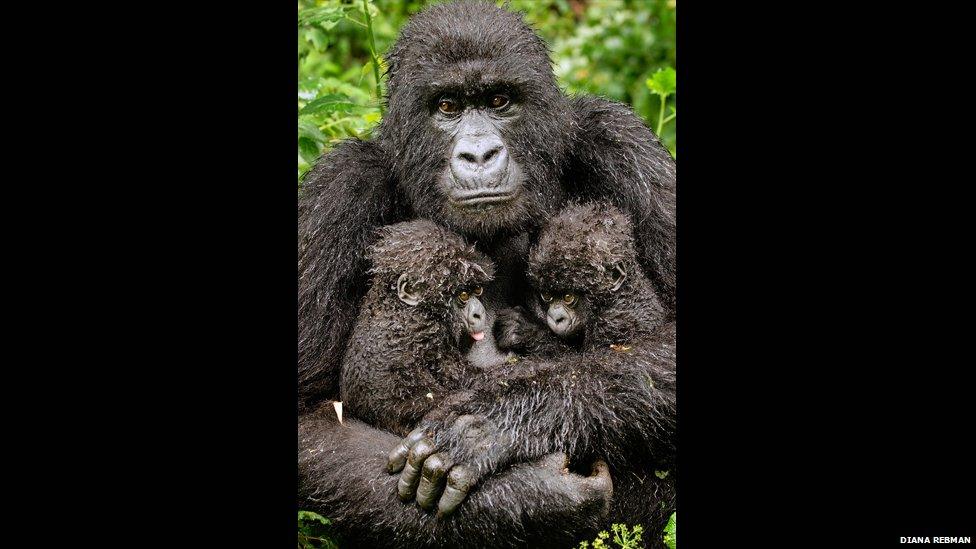In pictures: Wildlife Photographer of the Year
- Published
-essenceofelephants.jpg)
The overall winner of the 2013 Wildlife Photographer of the Year is Greg du Toit (South Africa) for his photo Essence of Elephants. He said: "I’ve wanted to create an image that captures their special energy and the state of consciousness that I sense when I’m with them. This image comes closest to doing that."
-mother'slittleheadful.jpg)
Fourteen year-old Udayan Rao Pawar (India) is junior overall winner for a nesting colony of gharial crocodiles. "I could hear them making little grunting sounds," he said. "Very soon a large female surfaced near the shore, checking on her charges. Some of the hatchlings swam to her and climbed onto her head. Perhaps it made them feel safe." It turned out that she was the chief female of the group, looking after all the hatchlings.

Diana Rebman (US) photographed these gorilla twins in Rwanda’s Volcanoes National Park. She said: "It was a really arduous hike because that day it happened to be raining. The mum with twins was feeding and the silverback ran her off, he wanted the nettle she was eating. In my photo she looks stressed." She was only allowed one hour to take photos. "We were basically on a stopwatch, you have to take what you get," she added.
-tigeruntrapped.jpg)
This picture of an endangered Amur, or Siberian, tiger is one of only a very few taken in the wild without the use of a camera trap. Toshiji Fukuda (Japan) has been photographing wildlife in the Russian Far East for more than 20 years, so when he heard that tiger tracks had been found on the shore of Russia’s Lazovsky Nature Reserve, he knew this was his chance. His photo wins The Gerald Durrell Award for Endangered Species.
-stickysituation.jpg)
Isak Pretorius (South Africa) is winner of the Behaviour Birds category. He captured this lesser noddy caught in a colossal spider's net on the Seychelles island. He explained that it was "a bit of an eerie picture because the bird is still alive, you can see the pain and the inevitable story that’s evolving. It strikes an emotional chord". Even if they struggle free, the silk clogs up their feathers so they can’t fly.
-cold-bloodedkilling.jpg)
Alejandro Prieto (Mexico) was commended for capturing this scene of cold-blooded behaviour: a crocodile eating a green turtle in Corcovado National Park, on the Pacific coast of Costa Rica. He said he was "at the right moment at the right time". He was waiting to see a bull shark and captured the scene by chance. "For a crocodile to be eating a turtle, you don't see that very often - I wasn't expecting that."
-showdown.jpg)
At a waterhole in the Kalahari National Park, Peter Delaney (Ireland) came across scores of white-backed and lappet-faced vultures on an eland carcass, squabbling over the meat. He said: "It was midday, it was very hot, there was a stench of death and an intense buzz of flies. The vultures were vying for dominance at the carcasses."
-badboys.jpg)
Andrew Walmsley (UK) was runner up in the mammal behaviour category. The critically endangered Celebes crested macaques are only found on Sulawesi and nearby islands. He was photographing the male who was gazing peacefully out to sea, when suddenly the peace was shattered by noise from behind. "I turned round to see these young males charging. They were screaming, kicking up gravel and making as big a show as possible, their faces full of expression."
-grandraven.jpg)
Chris Aydlett (US) spotted this raven perched on the south rim of the Grand Canyon. He saw the photographic potential but thought the bird would fly away as soon as he got out of his car, so he grabbed his camera. But it stayed, watching him and giving him time to select a rock as a substitute tripod. SOME VIEWERS MAY FIND THE NEXT PHOTO UPSETTING
-outofafrica.jpg)
Brent Stirton (South Africa) won The Wildlife Photojournalist Award for his photo at Kenya’s Amboseli National Park. An undercover ranger responded to news of an elephant death by de-tusking the corpse at dawn to prevent the ivory falling into the hands of poachers.